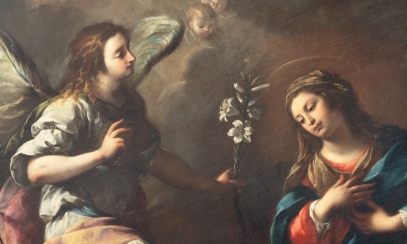
Bishop Boyea's Year of the Bible
Get Bishop’s Year of the Bible Text BYOB to 84576
Get Bishop’s Year of the Bible Text BYOB to 84576
During this new liturgical year, Bishop Boyea invites us to enter into a closer relationship with the Lord through hearing him in the words of Scripture. We are encouraged to read a chapter of the Bible each day, and reflect on it together with our fellow pilgrims in the diocese. The following reflections from the bishop cover the chapters we’ll be reading from the beginning of Advent on Nov. 29 through Jan. 6. We’ll be offering more insights in upcoming issues. Please visit dioceseoflansing.org to sign up for daily readings sent by text or through email.
Nov. 29-Dec. 9
ISAIAH: 56-66
We are about to begin a pilgrimage together, a year during which we hope to walk with Jesus, to hear his voice and to encounter him all through the Word of God. We begin over these first 11 days of Advent with the last 11 chapters of the Book of the prophet Isaiah.
These chapters were written as some of the exiles in Babylon were settling back in the Jerusalem area, but before the Temple was rebuilt or the city walls reconstructed – sometime around the year 520 B.C. There were tensions with those who had remained in the area during the exile, many of whom had mixed with other local peoples.
Thus, we will read of sadness and concern, yet also of great hope for the future, of what God will do that will affect not only the Jewish people but all nations. Without all the old institutions to cling to, the prophet turns completely to God and the wonders he can work.
Of course, we believe that, in the end, Jesus is the fulfillment of these expectations. How good it is, then, that we can reflect on these chapters at the beginning of Advent.
Jerusalem and the former Temple area are seen as the places where God will fulfill his promises. This will still require a recognition of the evils of the past and the present. The prophet wants us to recognize that we are bearing the fruits of injustice in our midst. And it would be a new prophet who will speak the glad tidings to the poor and “a year of favor from the Lord” (Is 61:2), a passage that Jesus will read in the Synagogue in Nazareth (Lk 4:16-21) and state that he is fulfilling this prophecy.
Just as Jesus will later call people from sin and to conversion and then lead them to seek a new earth and a new heaven, so these chapters of Isaiah lead us as well to the vision God has for us – that God delivers us, that God loves us, that God fights for us and, finally, that “all flesh shall come to worship before me, says the Lord.” (Is 66:23)
Dec. 10-Jan. 6
THE GOSPEL ACCORDING TO MATTHEW
During this Advent season, we now make a shift from the end of the prophet Isaiah to the Gospel of Matthew as we continue our Year of the Bible. Each Gospel will present Jesus in a slightly different way. Let us, as we read these chapters over the next 28 days, encounter the Lord as Matthew would have us see him.
The key here is to see Jesus as a new Moses. Jesus is the final teacher, the one whose word is the word of the Son of God as he proclaims the kingdom of God. This will be easy to see in the five major talks which Jesus gives. The most famous, of course, is the Sermon on the Mount. (chaps. 5-7) But there are also his missionary directives to the Twelve (10) and then the wonderful chapter of Parables. (13) Finally, the last two of the talks are on community and our care for one another (18) and Jesus’ judgment on his times and the final judgment. (23-25)
Interweaving all these are the stories which we will find in the other Gospels, especially Mark. In those stories, however, Matthew really wants us to see that the Church founded on Peter and his faith in Jesus is to be our context for living out the Christian life.
But mostly, Matthew wants us to see that Jesus is the fulfillment of all God’s plans, those plans announced by the prophets in the Old Testament and those plans only now revealed in Jesus himself. Jesus is our salvation.
At the beginning of the Gospel, we have the account of Jesus’ birth and the strong focus on St. Joseph; this is a more masculine approach than the more feminine one presented in the Gospel of St. Luke.
Then, like the other Gospels, we end with the account of the Last Supper and the suffering, death and resurrection of Jesus. This is the capstone to all that has come before. Without this reality of death leading to life, the rest of the Gospel would make little sense. Jesus would just be a teacher and a miracle worker. But he is indeed the Son of God who offers us eternal life.
Brothers and Sisters, enjoy these four weeks as we together encounter the Lord in the Gospel of Matthew.



